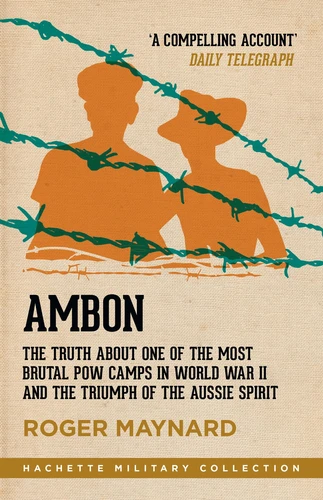Ambon. The truth about one of the most brutal POW camps in World War II and the triumph of the Aussie spirit
Par :Formats :
Disponible dans votre compte client Decitre ou Furet du Nord dès validation de votre commande. Le format ePub protégé est :
- Compatible avec une lecture sur My Vivlio (smartphone, tablette, ordinateur)
- Compatible avec une lecture sur liseuses Vivlio
- Pour les liseuses autres que Vivlio, vous devez utiliser le logiciel Adobe Digital Edition. Non compatible avec la lecture sur les liseuses Kindle, Remarkable et Sony
- Non compatible avec un achat hors France métropolitaine
 , qui est-ce ?
, qui est-ce ?Notre partenaire de plateforme de lecture numérique où vous retrouverez l'ensemble de vos ebooks gratuitement
Pour en savoir plus sur nos ebooks, consultez notre aide en ligne ici
- Nombre de pages352
- FormatePub
- ISBN978-0-7336-3063-7
- EAN9780733630637
- Date de parution28/07/2014
- Protection num.Adobe DRM
- Infos supplémentairesepub
- ÉditeurHachette Australia
Résumé
Survival, heroism, courage and mateship in Ambon - a place of nightmares. In February, 1942, Ambon, an Indonesian island north of Darwin, fell to the Japanese army and the Allied forces defending it were captured. Over a thousand of these soldiers were Australian. By the end of the war, just one-third of them had survived and Ambon became a place of nightmares, one of the most notorious of all POW camps the war had seen.
Many of the men captured were massacred, and of those who initially survived, many later succumbed to the sadistic brutality of the Japanese guards. Starvation also took a fearful toll, and then there were the medical 'experiments'. It was a place almost without hope for those who held on, made worse by the fact that the savagery inflicted on them wasn't limited to their captors but also came from their own.
One soldier described their hopelessness towards the end with the bleak words: 'The men knew they were dying.'Yet astoundingly there were survivors and in Ambon they speak of not just the horrors, but the bravery, endurance and mateship that got them through an ordeal almost impossible to imagine. The story of Ambon is one of both the depravity and the triumph of the human spirit; it is also one that's not been widely told.
Until now.
Many of the men captured were massacred, and of those who initially survived, many later succumbed to the sadistic brutality of the Japanese guards. Starvation also took a fearful toll, and then there were the medical 'experiments'. It was a place almost without hope for those who held on, made worse by the fact that the savagery inflicted on them wasn't limited to their captors but also came from their own.
One soldier described their hopelessness towards the end with the bleak words: 'The men knew they were dying.'Yet astoundingly there were survivors and in Ambon they speak of not just the horrors, but the bravery, endurance and mateship that got them through an ordeal almost impossible to imagine. The story of Ambon is one of both the depravity and the triumph of the human spirit; it is also one that's not been widely told.
Until now.
Survival, heroism, courage and mateship in Ambon - a place of nightmares. In February, 1942, Ambon, an Indonesian island north of Darwin, fell to the Japanese army and the Allied forces defending it were captured. Over a thousand of these soldiers were Australian. By the end of the war, just one-third of them had survived and Ambon became a place of nightmares, one of the most notorious of all POW camps the war had seen.
Many of the men captured were massacred, and of those who initially survived, many later succumbed to the sadistic brutality of the Japanese guards. Starvation also took a fearful toll, and then there were the medical 'experiments'. It was a place almost without hope for those who held on, made worse by the fact that the savagery inflicted on them wasn't limited to their captors but also came from their own.
One soldier described their hopelessness towards the end with the bleak words: 'The men knew they were dying.'Yet astoundingly there were survivors and in Ambon they speak of not just the horrors, but the bravery, endurance and mateship that got them through an ordeal almost impossible to imagine. The story of Ambon is one of both the depravity and the triumph of the human spirit; it is also one that's not been widely told.
Until now.
Many of the men captured were massacred, and of those who initially survived, many later succumbed to the sadistic brutality of the Japanese guards. Starvation also took a fearful toll, and then there were the medical 'experiments'. It was a place almost without hope for those who held on, made worse by the fact that the savagery inflicted on them wasn't limited to their captors but also came from their own.
One soldier described their hopelessness towards the end with the bleak words: 'The men knew they were dying.'Yet astoundingly there were survivors and in Ambon they speak of not just the horrors, but the bravery, endurance and mateship that got them through an ordeal almost impossible to imagine. The story of Ambon is one of both the depravity and the triumph of the human spirit; it is also one that's not been widely told.
Until now.




